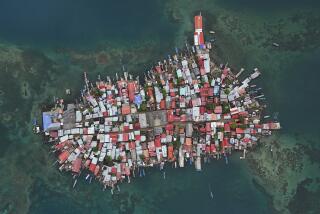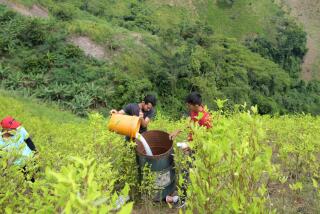Riddles, Coconuts Abound in Tobago : West Indies: Residents enjoy idyllic existence scant 21 miles away from disintegration on sister island of Trinidad.
- Share via
PLYMOUTH, Tobago — A sign on the beach sums up the hazards of Tobago:
Beware of Falling Coconuts.
There is no record of how many casualties have been caused by coconuts on this sleepy island of 45,000, where people rarely bother to lock their cars or homes and consider themselves a world apart from Trinidad, the bigger of the two islands that make up the republic of Trinidad and Tobago.
“I haven’t been there (in Trinidad) for years,” said a shopkeeper in the village of Plymouth on Tobago’s north coast. “Ain’t safe, too fast, too noisy.”
How Tobagonians managed to evade many of the problems of their sister island, only 21 miles away by sea, is almost as mysterious as the inscription on the tombstone of Betty Stivens who died near Plymouth in 1783:
“What was remarkable about her, she was a mother without knowing it, and a wife without letting her husband know except by her kind indulgences to him.”
Tobagonians have given up trying to solve the Stivens riddle. But in Trinidad, there are ready explanations as to why Tobago appears to enjoy an idyllic existence at a time of severe economic crisis on the bigger island.
“This man Robinson is looking after his own. He is spending millions and millions on Tobago,” said a businessman in Port of Spain.
Prime Minister A. N. R. Robinson comes from the Tobago village of Castara and according to many of his critics, he has worked unceasingly since a landslide electoral victory in 1986 to ensure prosperity for his home island.
Under Robinson’s administration, the runway at the Tobago airport has been lengthened to accommodate wide-body aircraft and the harbor at Scarborough, Tobago’s capital, is being extended to provide berths for cruise ships.
The projects are part of the government’s efforts to diversify an economy whose dependence on oil led to a steep decline in living standards after the collapse of oil prices in the early 1980s.
Criticism of the Robinson government appears to come chiefly from citizens of Indian descent, whose forefathers were brought to the islands as indentured laborers after the 1838 abolition of slavery created a labor shortage.
Government statistics say Indians account for 40.7% of the population, descendants of African slaves for 40.8%. The rest are European, Chinese, and mixtures of all description.
Robinson, who is of African descent, won 1986 elections that broke with Trinidadian tradition of voting along racial lines. He ran as candidate of an opposition coalition that embraced both Indian and African parties.
The alliance collapsed in 1988, when Robinson fired four Cabinet ministers, all Indians, who had criticized him for autocratic leadership.
“The prime minister is following racist policies,” said Basdeo Panday, who lost his posts of deputy prime minister and foreign minister in the 1988 sacking. “All his actions show that he is a racist.”
Panday now heads a new party he says is organized on multiracial lines. Government supporters insist that it draws most of its backing from the Indians.
Politicians from both major ethnic groups accuse each other of fostering racial frictions that they say barely exist at grass-roots level. Still, ordinary citizens use racial epithets frequently and freely.
Census figures tend to confirm that on a personal level, race plays a role of diminishing importance: the percentage of the population defined as “mixed” has risen steadily and now stands at 18%.
“There is no perfect racial harmony here,” said the Indian owner of an import-export company who is married to a Chinese woman with two children from her first marriage to a white Trinidadian.
“But there is nothing like the bloody racial conflict I experienced when I lived in Miami and New York.”
Newspaper circulation has declined over the last few years because of the economic crisis but the republic, which has a literacy rate of 97%, still enjoys an unusually varied press.
Apart from two daily newspapers, there is a wide array of popular weeklies whose rich fare of anti-government criticism, news and the supernatural could put the U.S. supermarket press or European mass circulation papers to shame.
Fierce competition pits The Bomb against Blast, which claims to be the islands’ circulation leader and has a regular court page--Blast in Court--with a devoted following.
Residents say the weeklies provide a good pointer to Trinidad and Tobago’s laid-back attitude toward life and citizens’ appetite for wine, women and song.
Court cases in a recent issue of Blast included the theft of coconuts from a neighbor’s garden and the cocaine trial of Eric Ramjit, who told a judge he had taken the drug to soothe fierce toothaches. He was fined $175.
More to Read
Sign up for Essential California
The most important California stories and recommendations in your inbox every morning.
You may occasionally receive promotional content from the Los Angeles Times.













